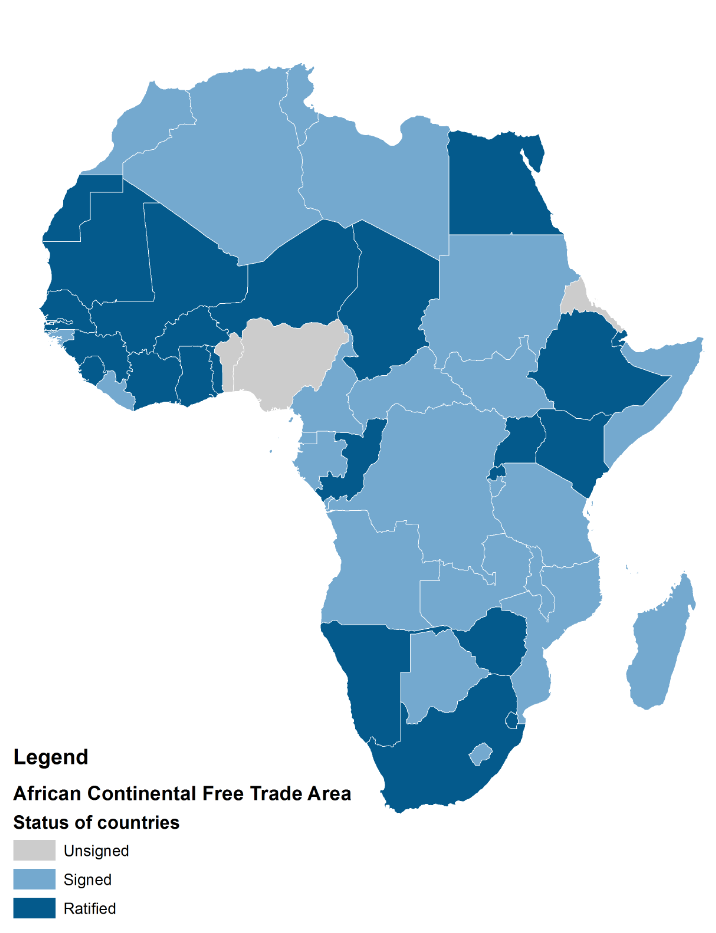Introduction: The Dawn of a New Era
Imagine a vibrant, interconnected continent where goods and services flow seamlessly across borders, fueling economic growth and prosperity. This is the promise of the African Continental Free Trade Area (AfCFTA), a transformative agreement that has the potential to usher Africa into a new era of economic development. By eliminating tariffs and other trade barriers, the AfCFTA seeks to create a single market for African countries, fostering greater intra-African trade and investment, and unlocking the continent’s vast economic potential.

Image: www.brookings.edu
The Pillars of Free Trade: Enhanced Competitiveness
Free trade is predicated on the principle of comparative advantage. By removing trade barriers, businesses can specialize in industries where they are most efficient, leading to increased productivity and lower costs. For African countries, this means that businesses can focus on producing goods and services that they can offer at a competitive advantage, while sourcing inputs and products from other African countries where they can be obtained at the lowest cost. This specialization and division of labor can lead to significant cost savings, improved product quality, and increased innovation.
Expanding Markets: Access to a Vast Consumer Base
One of the most significant benefits of free trade is the creation of a larger and more accessible market for businesses. By uniting the African market, the AfCFTA creates a combined consumer base of over 1.3 billion people, representing immense purchasing power. This expanded market allows African businesses to access new customers and scale up their operations, leading to increased sales, revenue, and economies of scale.
Job Creation and Economic Growth: Powering Africa’s Workforce
Free trade acts as a catalyst for economic growth and job creation. By fostering trade and investment, new sectors and industries emerge, creating employment opportunities and enhancing the earning potential of African workers. The reduction of trade barriers also lowers the cost of doing business, making it more attractive for domestic and foreign companies to invest in Africa, further driving job creation and economic growth.

Image: medium.com
Innovation and Technological Advancement: Incubating African Solutions
Free trade stimulates innovation and technological advancement by promoting the exchange of ideas, knowledge, and technologies. By connecting African businesses to a wider market and facilitating the transfer of technology, the AfCFTA encourages businesses to invest in research and development, leading to the creation of new products and services that cater to the unique needs of the African market. This innovation-driven ecosystem has the potential to transform Africa into a global hub for entrepreneurship and ingenuity.
Infrastructure Development: Connecting the Continent
Efficient and reliable infrastructure is crucial for maximizing the benefits of free trade. The AfCFTA recognizes this and places great emphasis on promoting infrastructure development to enhance connectivity within the continent and with the rest of the world. By investing in roads, railways, ports, and other infrastructure projects, African countries can improve trade facilitation, reduce transportation costs, and facilitate the movement of goods and services across borders.
Capacity Building and Economic Empowerment: Equipping Africa
The full realization of the potential of the AfCFTA requires the strengthening of African countries’ productive capacities and economic empowerment. Through capacity building programs and support for small and medium-sized enterprises (SMEs), the AfCFTA seeks to enhance the participation of African businesses in regional and global value chains. By equipping African businesses with the skills, knowledge, and resources they need, the AfCFTA empowers them to compete effectively and benefit from the opportunities created by free trade.
Addressing Challenges: Navigating Obstacles
While the benefits of free trade are substantial, it is essential to acknowledge and address the potential challenges that may arise. Fear of competition, market distortions, and imbalances in trade can lead to protectionist sentiments. To mitigate these concerns, the AfCFTA includes safeguards and measures to protect sensitive industries and support vulnerable groups. Dialogue, cooperation, and a commitment to fair and equitable trade will be crucial for overcoming these challenges and ensuring that the benefits of free trade are widely shared.
Au Proposition For Free Trade In Africa
Conclusion: A Brighter Future for Africa
The African Continental Free Trade Area is a bold and visionary initiative that has the potential to transform Africa’s economic landscape. By embracing the power of free trade, African countries can unlock new opportunities, enhance their competitiveness, and accelerate economic development. As the continent embarks on this exciting journey toward greater integration and prosperity, it is vital to stay committed to the principles of free trade, promote inclusive policies, and address challenges with determination and unity. In doing so, Africa can fully harness its potential and create a brighter future for generations to come.






